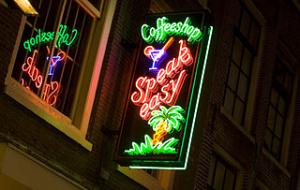After more than 30 years, the Dutch are finally going to do something about "the back door problem."
A federal bill to protect the 2nd Amendment rights of medical marijuana patients is filed, North Dakota backs away from messing with those rights, no medical marijuana for Tennessee this year, Texas bills get a public hearing, and more.
A pervy, predatory probation officer goes to prison, a half-dozen Maryland prison guards go down in a racketeering case, and more.
Medical marijuana and guns rights are in the news today, the Dutch embark on a pilot program of licensed legal marijuana grows, there is no medical marijuana for Tennessee this year, and more.
Some 20 senators sign on to a bill to solve legal marijuana's banking problem, a Maine jail appeals a federal court ruling that it must provide Suboxone to a prisoner, and more.
A set of Michigan bills would do some post-legalization cleanup, a decriminalization bill advances in Missouri, an Oklahoma bill protecting patient rights is signed by the governor, drug crop growers clash with authorities in Mexico and Peru, and more.
The Denver city council is trying to make it easier for marijuana social consumption businesses to open, a Colorado drug defelonization bill advances, a Democratic presidential contender calls for opioid decriminalization, and more.
Decriminalization bills are alive in Alabama and North Carolina, the Iowa Senate approves hemp, the FDA eases opioid prescribing rules, Ciudad Juarez sees a bloody weekend, and more.
Beginning in the mid-1980s, Holland was the world's marijuana mecca. Under the quite sensible policy of gedogen (pragmatic tolerance), Dutch authorities didn't quite legalize marijuana but instead effectively turned a blind eye, allowing licensed retail establishments -- the famous coffeeshops -- to sell five grams or less of marijuana, and to let their customers consume the products onsite despite prohibition remaining on the books.

an Amsterdam coffee shop (Creative Commons)
A generation of stoners made the pilgrimage to Amsterdam, getting wrecked on hash and primo
nederwiet (Dutch weed) and musing fuzzily about why their home countries couldn't be as cool about cannabis as the Netherlands. That was then.
Oh, the stoners still come for coffeeshops like the Bulldog and Die Melkweg, especially weekend punters from more puritanical locales, such as Britain and France, where weed can still get you in trouble. This is the "drug tourism" the Dutch decry even as they pocket the Euros.
But over the years, some of the luster has rubbed away, in part because conservative Dutch governments who were never happy with the coffeeshop scene whittled it down as much as they could, but also in part because the Dutch were standing still while the relaxation of marijuana prohibition gained momentum around the world.
Uruguay legalized it. Canada legalized it. Ten American states, the nation's capital, and two US territories legalized it, with another state or two or three likely to do it this year. And this was actual legalization, not the wink-wink-nudge-nudge "it's still illegal but we'll allow it" Dutch compromise. And while no European country has completely legalized it, decriminalization is afoot in broad swathes of the continent, and Spain allows private use and cultivation, as well as "cannabis clubs," especially in Catalonia.
Now, though, the Dutch are finally considering taking the next step, and that involves fixing a chronic issue for their system: the "back door problem." That is, while it has been allowed for the coffeeshops to sell marijuana, they have had no legal source of supply. The Dutch system had no provision for the regulated provision of product to the coffeeshops. Instead, while coffeeshops could openly sell to their customers through the front door, their black market weed supplies had to sneak in the back door.
A halting and limited effort to rectify the situation is now about to get underway. The coalition government announced last week that it will move forward with a pilot program in regulated marijuana production for the coffeeshops. Under the plan, the government will issue licenses to 10 growers who will each have to produce at least 10 types of marijuana product, with THC content clearly marked on the packaging. A minimum of six and a maximum of 10 local authorities will take part in the trials, which will last four years, meaning that it will be up to the next government to decide whether the Netherlands will press ahead with state-regulated production.
But both the local authorities' association, VNG, and the government's highest advisory body, the Council of State, have already criticized the plan as too limited and stringent. The plan seeks to completely eliminate the black market as a source for coffeeshop product: "Coffeeshops in the municipalities which are taking part in the experiment can only sell legally-produced hemp products and growers can only sell to those shops," the plan says. "This means the entire chain will be closed."
The local authorities in the country's two largest cities, Amsterdam and Rotterdam, have complained that the goal is unworkable, especially in Amsterdam, where more than a hundred coffeeshops are doing brisk business. The Council of State, meanwhile, has complained that the pilot program is too small and will not allow useful conclusions to be drawn.
Still, the coalition government is moving forward with the plan and says it expects final decisions on which local authorities will be involved by the end of the year. The Netherlands is now poised to once again move into the marijuana vanguard with state-regulated commercial marijuana production, even if the government's plan is still half-baked. We will see in four years whether the country is ready to finally solve the "back door problem" and fully embrace the marijuana business.
This article was produced by Drug Reporter, a project of the Independent Media Institute.
back to top
A federal bill to protect the 2nd Amendment rights of medical marijuana patients is filed, North Dakota backs away from messing with those rights, no medical marijuana for Tennessee this year, Texas bills get a public hearing, and more.
NationalFederal Bill Aims to Let Medical Marijuana Patients Keep Their Guns. Rep. Alex Mooney (R-WY) has filed a bill aimed at protecting the gun rights of medical marijuana patients. The Second Amendment Protection Act would grant an exemption from the federal law that says people cannot purchase firearms if they're "unlawful user[s] or addicted to any controlled substance" for state-legal medical marijuana patients.
North Dakota
North Dakota Lawmakers Back Away from Proposal for Database to Check Patients' Eligibility for Concealed Weapons Licenses. House lawmakers on last Tuesday approved a measure, Senate Bill 2140, that would require the Department of Health to disclose medical marijuana patients' identities to the Bureau of Criminal Investigation "for the sole purpose" of determining whether they are eligible and in compliance with the state's concealed weapons law. But on Wednesday, Attorney General Wayne Stenehjem reminded lawmakers that changes to the voter-approved medical marijuana law required a two-thirds vote, not a mere majority, so lawmakers voted to send the bill back to the Natural Resources Committee, where its chairman said he will strip the gun language from the bill so it can pass.
Oklahoma
Oklahoma Governor Signs Patient Protection Bill. Gov. Kevin Stitt (R) has signed into law HB 2612, the Oklahoma Medical Marijuana and Patient Protection Act. The measure protects patients' rights to possess firearms under state law and allows the Oklahoma Medical Marijuana Authority to hire its own investigators to probe alleged violations. The law will go into effect 90 days after the legislature adjourns, which will be at the end of May.
Tennessee
Tennessee Medical Marijuana Bills Are Dead for This Year. State Sen. Steve Dickerson (R-Nashville), a doctor and leading proponent of medical marijuana in the legislature, announced last Wednesday he was delaying all medical marijuana bills until next year. He said he was convinced the bill would fail, and decided it was better to delay the proposal than watch it fail in committee. "You can run a bill and have it defeated, or you can keep it alive," Dickerson said. "And practically speaking, we decided to keep it alive and not have a defeat for perception more than anything."
Texas
Texas Medical Marijuana Bills Get Hearing. The House Public Health Committee held a hearing on a trio of medical bills last Thursday. Testimony was sometimes highly emotional, and no one spoke up against medical marijuana. HB 122 would create a legal defense for patients possessing medical marijuana and doctors who recommend it; HB 1405 would allow hospital patients to use CBD cannabis oil; and HB 3703 would expand current use of CBD cannabis oil to all epilepsy patients, not just those with intractable epilepsy. No votes were taken.
Washington
Washington Senate Approves Allowing Medical Marijuana in School. The state Senate on Saturday overwhelmingly approved SB 5442, which would allow parents to administer medical marijuana to their children at school, on the school bus, and at after-school activities. The bill limits the kind of marijuana used to infused products and extracts.
[For extensive information about the medical marijuana debate, presented in a neutral format, visit MedicalMarijuana.ProCon.org.]
back to top
A pervy, predatory probation officer goes to prison, a half-dozen Maryland prison guards go down in a racketeering case, and more. Let's get to it:
In Kenosha, Wisconsin, a Kenosha County Sheriff's Department jail guard was arrested last Friday for allegedly delivering drugs to an inmate on repeated occasions. Guard Devine Jackson, 24, went down after a tip that he was smuggling cocaine into the jail inside tubes of tooth paste. When confronted, Jackson confessed. He now faces four felony charges: possession with intent to deliver cocaine (less than 1 gram) on or near a jail, manufacture/deliver cocaine (less than 1 gram) on or near a jail, deliver illegal articles to an inmate and misconduct in public office.
In Jessup, Maryland,
six prison guards and staff members were arrested Tuesday along with seven inmates and seven outside "facilitators" in a racketeering case at the Maryland Correctional Facility. The guards and prison staff allegedly took bribes to smuggle in contraband including drugs, tobacco, cell phones, and unauthorized flash drives. Among the drugs involved were heroin, fentanyl, cocaine, ecstasy, marijuana and K2.
In Rome, Georgia, a former Rome probation officer was sentenced Monday to six years in prison for taking advantage of his position to coerce sexual favors from drug users under court supervision. Anyoel Cordovi had pleaded guilty to felony charges that he had sex with one probationer and exchanged nude photos with another. He will be required to register as a sex offender upon his release.
back to top
Medical marijuana and guns rights are in the news today, the Dutch embark on a pilot program of licensed legal marijuana grows, there is no medical marijuana for Tennessee this year, and more.

The Dutch are finally moving to resolve the "back door problem" of a legal weed supply for coffee houses. (Creative Commons)
California Bill to Block Home Marijuana Deliveries Killed. A bill that would have allowed localities to ban home deliveries of marijuana has died on a tie vote in the Assembly Business and Professions Committee. AB 1530 stalled amid concerns it would further hamper the state's struggling legal marijuana industry. Bill sponsor Assemblyman Ken Cooley (D-Cordova) said he will decide later whether to try again next year.
Wisconsin Poll Has Strong Support for Legalization. A new Marquette University Law School poll has support for marijuana legalization at 59%. Support for medical marijuana was even higher at 83%. Gov. Tony Evers (D) has called for the legalization of medical marijuana and the decriminalization of up to 50 grams.
Medical Marijuana
Federal Bill Aims to Let Medical Marijuana Patients Keep Their Guns. Rep. Alex Mooney (R-WY) has filed a bill aimed at protecting the gun rights of medical marijuana patients. The Second Amendment Protection Act would grant an exemption from the federal law that says people cannot purchase firearms if they're "unlawful user[s] or addicted to any controlled substance" for state-legal medical marijuana patients.
North Dakota Lawmakers Back Away from Proposal for Database to Check Patents' Eligibility for Concealed Weapons Licenses. House lawmakers on Tuesday approved a measure, Senate Bill 2140, that would require the Department of Health to disclose medical marijuana patients' identities to the Bureau of Criminal Investigation "for the sole purpose" of determining whether they are eligible and in compliance with the state's concealed weapons law. But on Wednesday, Attorney General Wayne Stenehjem reminded lawmakers that changes to the voter-approved medical marijuana law required a two-thirds vote, not a mere majority, so lawmakers voted to send the bill back to the Natural Resources Committee, where its chairman said he will strip the gun language from the bill so it can pass.
Tennessee Medical Marijuana Bills Are Dead for This Year. State Sen. Steve Dickerson (R-Nashville), a doctor and leading proponent of medical marijuana in the legislature, announced Wednesday he was delaying all medical marijuana bills until next year. He said he was convinced the bill would fail, and decided it was better to delay the proposal than watch it fail in committee. "You can run a bill and have it defeated, or you can keep it alive," Dickerson said. "And practically speaking, we decided to keep it alive and not have a defeat for perception more than anything."
International
Dutch to Move Forward with Legal, Regulated Marijuana Production for Coffee Shops. The Dutch government released detailed plans Thursday for moving forward with regulated marijuana production to supply the country's famous coffee shops. The plan is to license 10 growers, each of which will grow at least 10 different strains. THC content will be clearly labeled. At least six and no more than 10 local authorities will take part in the trials, which will last four years. It will then be up to the next cabinet to decide whether to move forward with state-regulated marijuana production. The plan is being criticized by some local authorities and coffee shops as being too restrictive by requiring that all cannabis sold in participating coffee shops come from the licensed growers.
back to top
Some 20 senators sign on to a bill to solve legal marijuana's banking problem, a Maine jail appeals a federal court ruling that it must provide Suboxone to a prisoner, and more.
Marijuana PolicyBipartisan Federal Bill Would Open Banks to Marijuana Businesses. Sens. Jeff Merkley (D-OR) and Cory Gardner (R-CO), along with 18 other cosponsors, filed legislation Thursday that would shield banks that maintain accounts for marijuana businesses from being punished by federal regulators. The Secure and Fair Enforcement (SAFE) Act would stop federal agencies from being able to "prohibit, penalize, or otherwise discourage a depository institution from providing financial services to a cannabis-related legitimate business or service provider or to a State, political subdivision of a State, or Indian Tribe that exercises jurisdiction over cannabis-related legitimate businesses." Companion legislation in the House has already passed out of committee and awaits a House floor vote.
Medical Marijuana
Texas Medical Marijuana Bills Get Hearing. The House Public Health Committee held a hearing on a trio of medical bills Thursday. Testimony was sometimes highly emotional, and no one spoke up against medical marijuana. HB 122 would create a legal defense for patients possessing medical marijuana and doctors who recommend it; HB 1405 would allow hospital patients to use CBD cannabis oil; and HB 3703 would expand current use of CBD cannabis oil to all epilepsy patients, not just those with intractable epilepsy. No votes were taken.
Drug Treatment
Maine Jail Appeals Federal Court Ruling It Must Provide Drug Used in Opioid Treatment. The Aroostook County Jail is appealing a federal judge's ruling that it must provide an opioid addiction medication it says it is necessary to keep addiction in remission. A federal judge granted a preliminary injunction on March 27 that required the jail to provide buprenorphine (Suboxone) to the prisoner. The jail argues that the judge didn't defer enough to jail administrators for policymaking decisions.
back to top
A set of Michigan bills would do some post-legalization cleanup, a decriminalization bill advances in Missouri, an Oklahoma bill protecting patient rights is signed by the governor, drug crop growers clash with authorities in Mexico and Peru, and more.

Peruvian coca farmers clashed with police and eradicators last Friday, leaving two dead. (deamuseum.org)
Michigan Bills Would Cut Sentences for People Jailed for Possession. State Sen. Sylvia Santana (D-Detroit) has filed a package of bills that would reduce prison, parole, and probation sentences for people jailed for marijuana possession. SB 262 through SB 265 are now before the Senate Judiciary and Public Safety Committee. "After the passage of Proposal 1, it's time we rethink drug sentencing laws in Michigan, so let's start with marijuana offenses, since those are no longer considered crimes under current law," Santana said.
Missouri Decriminalization Bill Advances. The House Special Committee on Criminal Justice last Thursday unanimously approved HB 1095, which would decriminalize the possession of up to 10 grams of marijuana. The measure would also make possession of less than 35 grams from a felony to a Class D misdemeanor. The measure now heads for a House floor vote.
Oregon Social Consumption Bill Dies. A bill that would have allowed marijuana consumption lounges, SB 639, was among hundreds of bills that died in the legislature after failing to move out of committee by April 9. The bill's failure is a blow to the state's legal marijuana industry, which is faced with chronic oversupply.
Medical Marijuana
Oklahoma Governor Signs Patient Protection Bill. Gov. Kevin Stitt (R) has signed into law HB 2612, the Oklahoma Medical Marijuana and Patient Protection Act. The measure protects patients' rights to possess firearms under state law and allows the Oklahoma Medical Marijuana Authority to hire its own investigators to probe alleged violations. The law will go into effect 90 days after the legislature adjourns, which will be at the end of May.
Washington Senate Approves Allowing Medical Marijuana in School. The state Senate on Saturday overwhelmingly approved SB 5442, which would allow parents to administer medical marijuana to their children at school, on the school bus, and at after-school activities. The bill limits the kind of marijuana used to infused products and extracts.
International
Mexico Poppy Farmers Detain Soldiers in Eradication Protest. Residents of a rural town in Guerrero state said they detained 40 soldiers last week to demand they halt opium poppy eradication efforts. The farmers said they set up roadblocks to prevent soldiers from leaving the region and called on the state and federal governments to provide assistance to local farmers so they aren't forced to grow opium. The farmers said the state government had promised in November that their poppy crops would not be destroyed and alternative means of support would be provided, but neither happened.
Peru Clashes Over Coca Eradication Leave Two Farmers Dead. Two coca growers were killed in clashes with a large eradication team last Friday. The team, which consisted of 72 police officers and158 civilian eradicators, had arrived in the area near the Bolivian border to destroy illegal coca fields, but reported that they were attacked by people wielding machetes and sticks as they set up camp. But the mayor of the town of San Gaban said witnesses told him police fired indiscriminately. "They were shooting right and left. That's why we have this bloodshed," the mayor said.
back to top
The Denver city council is trying to make it easier for marijuana social consumption businesses to open, a Colorado drug defelonization bill advances, a Democratic presidential contender calls for opioid decriminalization, and more.

The Denver city council is trying to find room for more social consumption spaces. (Creative Commons)
Denver City Council Moves to Boost Social Consumption Businesses. More than two years after voters approved social use of marijuana in licensed businesses, only two such businesses exist, and now, the City Council is moving to boost their prospects. The Council voted 9-2 on Monday to advance a proposal that would allow such businesses to operate closer to rec centers, day cares, and other such facilities. The law approved by voters required that such establishments be at least 1,000 feet from schools, but city officials added similar requirements for day care, rec centers, and addiction treatment centers. Under this bill, that distance requirement is dropped to 500 feet for all categories except schools.
Hemp
Nebraska Hemp Bill Advances. State lawmakers have given a first approval to a measure to legalize hemp production, LB 657. The bill advanced on a 37-4 vote despite a filibuster from a senator who warned it was a stalking horse for marijuana legalization. The bill enjoys bipartisan support and Gov. Pete Ricketts (R) says his administration is working with bill sponsor Sen. Justin Wayne (D-Omaha) to get the bill through. It still needs two more votes before going to the governor.
Heroin and Prescription Opioids
Democratic Presidential Contender Andrew Yang Calls for Opioid Decriminalization. Startup veteran, Venture for America founder, and Democratic presidential contender Andrew Yang used a CNN town hall Sunday night to flesh out an earlier proposal to decriminalize opioids. Calling opioid addiction "a plague," Yang said the goal of decriminalization was to get more Americans in treatment and out of jail. "We need to decriminalize opiates for personal use," Yang said. "I'm also for the legalization of cannabis."
Sentencing Policy
Colorado Drug Defelonization Bill Heads for House Floor Vote. A bill that would shift drug possession charges from felonies to misdemeanors was approved by the House Appropriations Committee Tuesday. That's the final committee vote before HB19-1263 heads for a House floor vote. The bill has already been approved by the House Finance and House Judiciary committees.
(This article was prepared by StoptheDrugWar.org's 501(c)(4) lobbying nonprofit, the Drug Reform Coordination Network, which also pays the cost of maintaining this website. DRCNet Foundation takes no positions on candidates for public office, in compliance with section 501(c)(3) of the Internal Revenue Code and does not pay for reporting that could be interpreted or misinterpreted as doing so.)
back to top
Decriminalization bills are alive in Alabama and North Carolina, the Iowa Senate approves hemp, the FDA eases opioid prescribing rules, Ciudad Juarez sees a bloody weekend, and more.

Hydrocodone. New FDA rules will allow docs to taper patients off opioids, instead of going cold turkey. (Creative Commons)
Alabama Decriminalization Bill Advances. The Senate Judiciary Committee on Wednesday approved SB 98, which would decriminalize the possession of up to an ounce of marijuana. People caught with less than an ounce would face a maximum $250 fine for the first two offenses, but possession of between one and two ounces would be a Class A misdemeanor and possession of more than two ounces would be a Class C felony worth up to 10 years in prison.
Michigan Bills Would Cut Sentences for Pot Prisoners, Probationers. A package of bills from Sen. Sylvia Santana (D) would allow people on probation or in prison for marijuana offenses to have their sentences reduced or eliminated. While there are only three people in state prison who would be affected, more than 1,300 people are on probation for marijuana offenses. "We have already legalized marijuana in the state so therefore this is just the right thing to do," Santana said.
North Carolina Decriminalization Bill Filed. Four state representatives have cosponsored HB766, which would "decriminalize possession of four ounces or less of marijuana and allow for the expunction of possession of marijuana offenses involving possession of four ounces or less of marijuana." It's been referred to the House Rules Committee.
Hemp
Iowa Senate Passes Hemp Legalization. The Senate voted 49-1 to approve SF 599, the Industrial Hemp Act. The hemp industry would be regulated by the state Department of Agriculture and Land Stewardship. The bill now goes to the House.
Heroin and Prescription Opioids
FDA Eases Opioid Policy to Allow for Tapering. The Food and Drug Administration has issued labeling changes for prescription opioids that instruct physicians to taper opioid prescriptions rather than cut them down or off. The agency also acknowledged that a 2016 CDC guideline restricting opioid prescriptions had resulted in harms to patients. "Recently, the FDA has received reports of serious harm, including serious withdrawal symptoms, uncontrolled pain and suicide, in patients who are physically dependent on opioid pain medicines when these medicines are suddenly discontinued or when the dose is reduced too quickly, often without adequate patient communication, follow-up or support," the FDA said in an April 9 announcement. "These practices have also been associated with patients attempting to find other sources of opioids in order to minimize their withdrawal symptoms or self-medicate for pain," the statement said.
Harm Reduction
California Bill Would Let Localities Veto Needle Exchange Programs. State Sen. John Moorlach (R-Orange County) has filed a bill that would require city or county officials to sign off before needle exchanges could operate in their jurisdictions. SB 689 is opposed by public health advocates, who fear it could lead to increased HIV and Hep C transmission and even overdose deaths. The bill is set for a hearing before the Senate Health Committee next week.
International
Mexico Sees Bloody Weekend in Ciudad Juarez. Ciudad Juarez saw its bloodiest weekend of the year so far, with 19 people killed last Friday, Saturday, and Sunday. That brings the death toll for the month so far to 79 as warring cartel factions fight over the lucrative plaza, or control of drug smuggling and retail sales operations.
back to top






